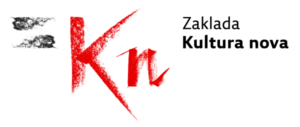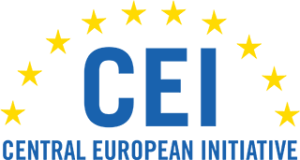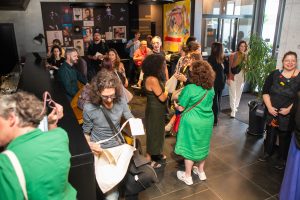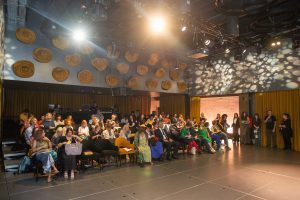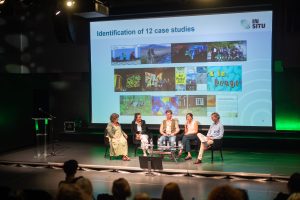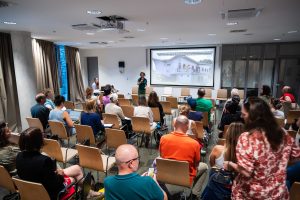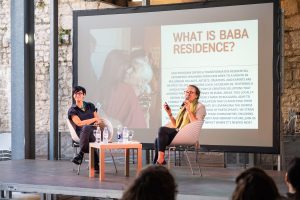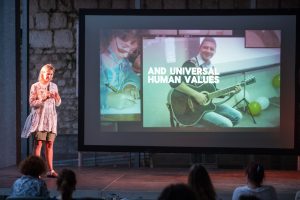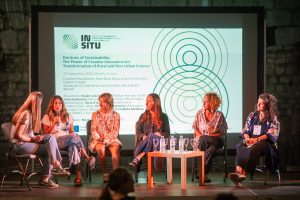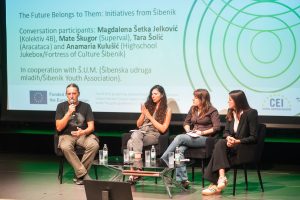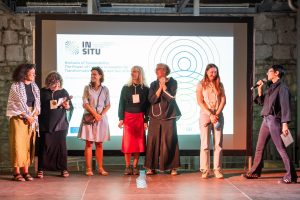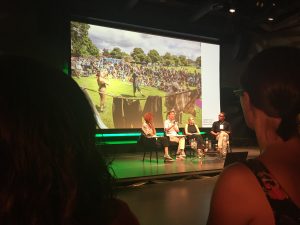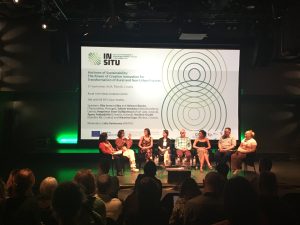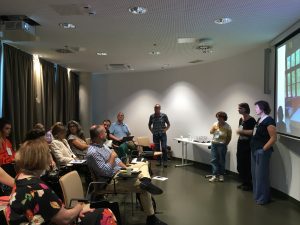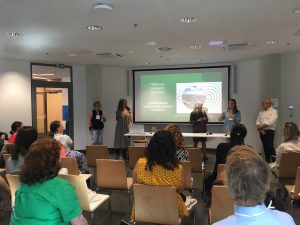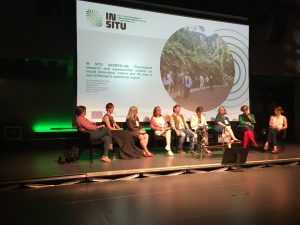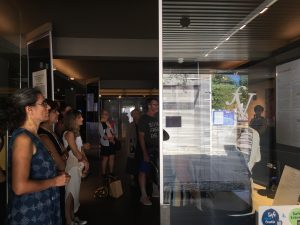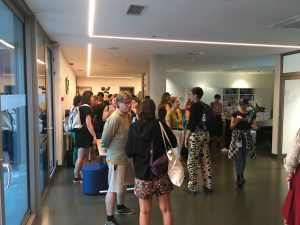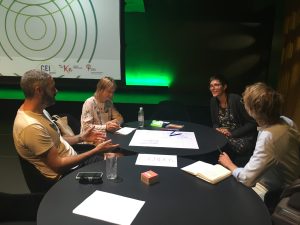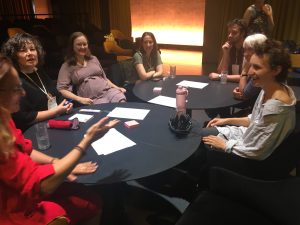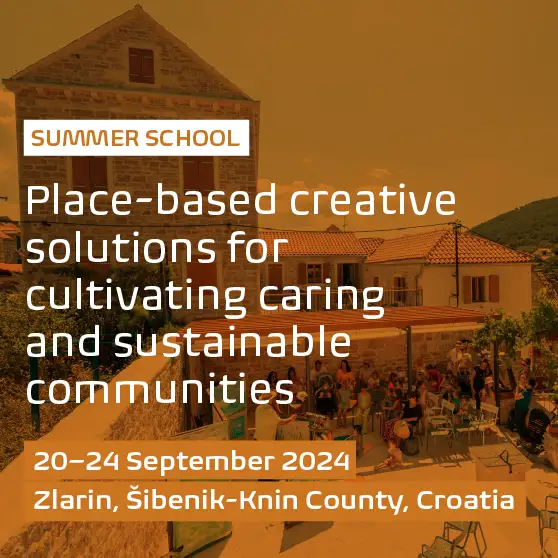Horizons of Sustainability: The Power of Creative Innovation for Transformation of Rural and Non-Urban Futures
25-27 September 2024
Šibenik, Croatia
See here some photo memories from the IN SITU Conference
The “Horizons of Sustainability: The Power of Creative Innovation for Transformation of Rural and Non-Urban Futures” Conference will take place in Šibenik, Croatia, from 25 to 27 September 2024, organised within the project IN SITU – Place-based Innovation of Cultural and Creative Industries in Non-urban Areas. This event is co-organised by the Centre for Social Studies of the University of Coimbra and the local partner Kultura Nova Foundation from Zagreb in cooperation with the partners of the IN SITU project. It is supported by the European Union’s Horizon Europe Research and Innovation Programme (Grant Agreement no. 101061747) and the Central European Initiative.
IN SITU is a four-year project that combines research and experimental actions to advance the innovation-related practices, capacities, and potentials of cultural and creative industries (CCIs) based in non-urban and rural areas of the EU. The project aims to better understand their forms, processes, and governance needs and to advance the ability of non-urban and rural CCIs to act as drivers of innovation, competitiveness, and sustainability. Ultimately, the aim is to contribute to a more informed and sustainable future for practitioners in cultural and creative industries based in non-urban and rural areas.
This first international conference of the IN SITU project will explore the transformative power of innovative approaches of cultural and creative agents in forging more equitable and sustainable communities beyond urban centres.
In this event, we wish to inspire new ways of learning from one another. We aim to create an intimate environment that enables meaningful discussions and networking opportunities across research, culture-based creative practice, and planning and policy-making spheres. Therefore, within the conference, we will create different spaces and opportunities to foster exchange and dialogue with non-conventional approaches that fully place participants in the context of the place where the event is located. This also means that the number of presentations will be limited to allow for these other approaches.
We invite proposals for presentations of papers and projects from scholars, researchers, artists, cultural practitioners, activists, policymakers and decision-makers from across the world and a broad range of disciplines.
All proposals should make an original contribution to the topic of place-based innovation and the transformative power of the creative and cultural sector in forging more equitable and sustainable communities in rural and non-urban areas.
Conference themes
Main theme
The conference takes a broad and forward-looking perspective, envisioning a future that unlocks the potential for positive, lasting changes in less urbanised areas through creative and cultural initiatives. In a world recovering from the COVID-19 pandemic and facing severe crises, ranging from climate change and wars to energy challenges, migration, and inflation, the need for significant positive transformations has reached an unprecedented urgency.
The conference focuses on rural and non-urban communities that are especially vulnerable in times of crisis due to limited resources and often facing depopulation challenges. Recent policy trends reflect a growing focus on the well-being and sustainability of extra-metropolitan communities in non-urban and rural territories. These communities exhibit a creative capacity for responses to contemporary challenges. Many scholars have highlighted the role of cultural actors across Europe, illustrating how they focus on place-based innovations, injecting a fresh energy and novel insights for the sustainability of their communities.
Sustainability needs creative, place-based innovation. In today’s complex global landscape, sustainability has matured into an all-encompassing paradigm spanning climate, energy, finance, food, health, education, heritage, culture, and numerous other domains. Achieving a lasting and balanced utilisation of resources is integral to sustainability, which demands economic, technological, soft, and social innovations to propose creative solutions tailored to local communities’ specific characteristics and needs.
The conference explores the potential, synergies, and challenges involved in reshaping social, economic, environmental, and cultural sustainability with attention to showcasing and analysing place-based innovation and creativity as forces in this transformative process. In non-urban and rural settings, these place-based innovations are particularly significant. They can effectively address local challenges and remarkably enhance the quality of life, vitality, and the overall sustainability of communities and territories.
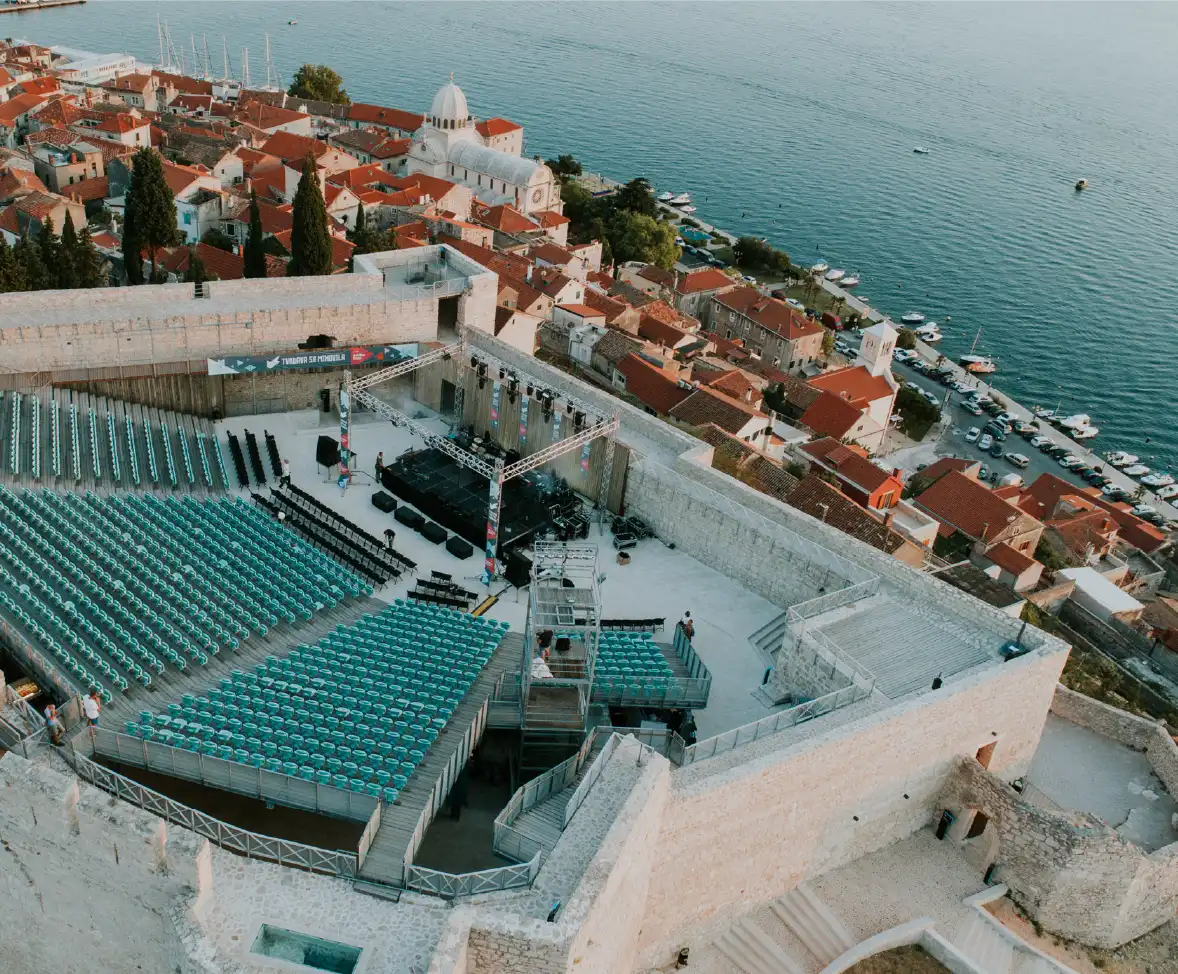
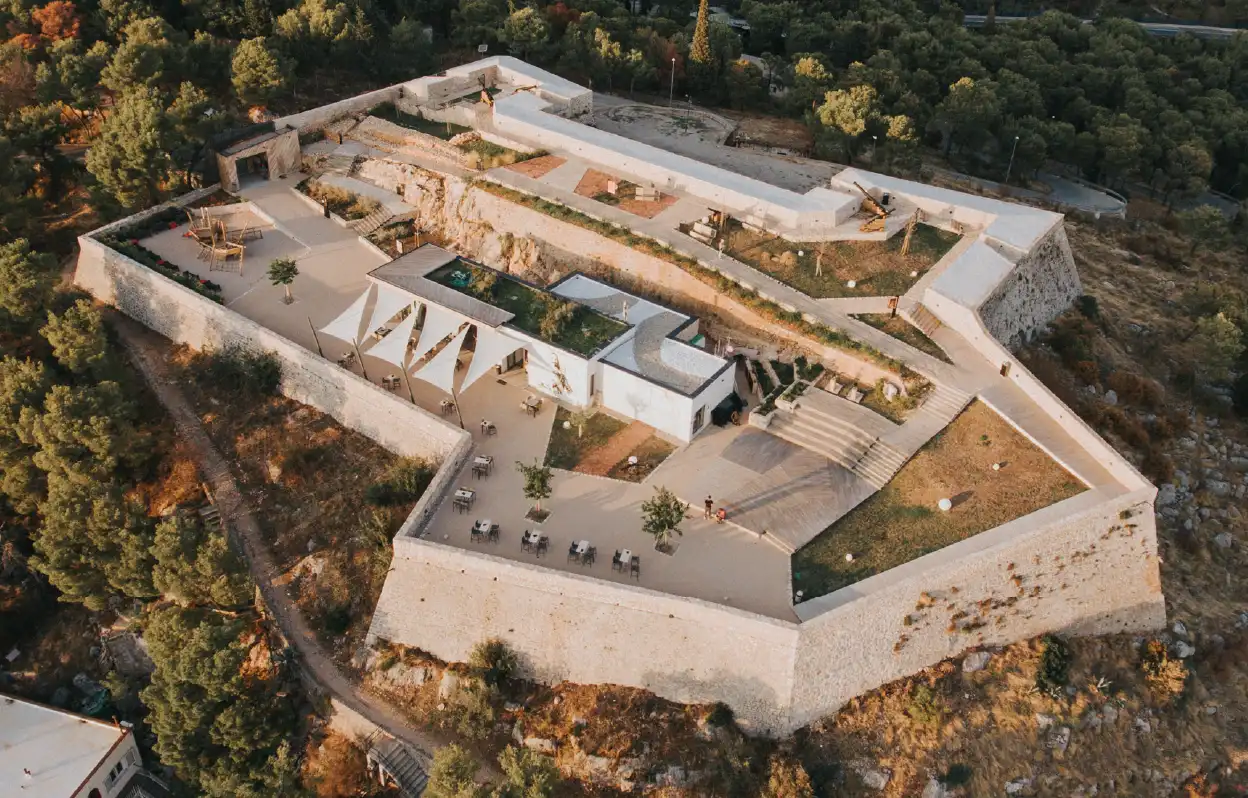
Sub-themes
A particular thematic focus of the conference will be care and children and youth’s creative engagement within these communities, recognising them as pivotal components of sustainable and resilient rural and non-urban societies.
One of the crucial aspects of placed-based innovation of cultural and creative actors is defining their commitment to care – for children, the elderly, common goods, resource sharing, and so forth. Care is gaining prominence in sustainability discussions, with some theorists and advocates proposing it as an organising principle for society and the economy. Over the past decade, care has also become more relevant in political discourse, shifting from traditional family relations to a broader perspective focusing on reshaping and revitalising communities. Culture, as a space for dialogue, plays a central role in supporting the transition to a “society of care.” It has the power to identify various strategies and tactics to engage citizens, contribute to the democratisation of societies, and raise awareness about urgent issues and the need to create equitable and sustainable societies. For culture to fulfil this role, it must be accessible financially, geographically, and socially and serve as a space for dialogue and participation based on principles of cultural democracy, ensuring that every voice is heard and engaged.
A shared concern that resonates in various rural and non-urban territories across Europe is the depopulation of these areas, which stands out as a critical threat to their sustainable future. In this scenario, the pivotal role of children and youth in cultural life and their contribution to creative innovations emerges as one of the most significant issues. This international conference is held in Šibenik – dubbed the “City of Children” for its longstanding Festival of Children dating back to the 1960s – and aims to shed light on children’s creative and engaging role in innovation for transforming rural and non-urban futures. This emphasis arises from the imperative to rejuvenate ageing communities in these territories and the sincere intent to actively involve new generations in discussions and actions shaping our collective future. In this regard, culture poses itself as the most persuasive strategy and means to encourage their engagement.
From all these points of view, the conference strives to open discussion on place-based innovation of culture and creativity and its transformative potential in preserving intrinsic values and contributing to the well-being of communities and societies. This approach evokes the need to encourage transformative cultural policy and a holistic approach to all public policies which regards culture as a connective tissue for social processes – an experimental, innovative, and creative realm for sustainable solutions in the public interest of local communities in rural and non-urban landscapes.
conference Programme
The IN SITU conference program offers a dynamic blend of presentations, discussions, and study visits, alongside a bustling interactive fair with representatives of different initiatives in Central and Eastern Europe, fostering meaningful discussions and networking opportunities across research, culture-based creative practice, and planning and policy-making spheres.
This Conference Guidebook has detailed information about the program, the abstracts of the concurrent sessions, and other useful information during the participants’ stay in Šibenik.
Study visits
As part of the program, the Conference plans a study visit on its 2nd day of activities to understand more deeply different relationships between cultural and natural resources and the community(ies) that live with and sustain them. There will be three options. You’ll be asked to choose one of them in the registration form. Limited places are available for each option.
Information on study visit options:
- Memorial Center Faust Vrančić (1551-1617) on the Prvić island dedicated to the figure, work and legacy of the great Croatian inventor, lexicographer, polyglot, philosopher, theologian and polyhistor who was the first to design the construction of the parachute and is most well known for the prototype of homo volans.
- The Croatian Coral Center Zlarin presents the story of the centuries-old tradition of coral cultivation on a small island in the Šibenik archipelago. Coral harvesting is the most important cultural heritage of the island. With the opening of the Coral Center, red coral became the driver of the island’s development in a completely different way. Instead of exploitation, red coral’s attractiveness and status became the basis of the narrative about the need to preserve biodiversity.
Submitting proposals
We invite proposals for presentations of papers and projects from scholars, researchers, artists, cultural practitioners, activists, policymakers and decision-makers from across the world and a broad range of disciplines.
The conference invites innovative and sustainable examples from across Europe and worldwide. A special geographical focus will be placed on innovative and sustainable cultural and creative practices in remote areas of Central and East Europe, often underrepresented, peripheral corners of Europe.
Proposals have to make an original contribution to the topic of place-based innovation and the transformative power of the creative and cultural sector in forging more equitable and sustainable communities in rural and non-urban areas.
Submission guidelines
We accept proposals for individual and collective presentations. Proposals should be in English and composed using the e-form available through this link. [Abstract submission closed]
Each proposal must include the following:
- Title
- Author(s)
- Email for the corresponding author
- Organizational affiliation(s) of author(s)
- Country(ies) of organisation
- Abstract of paper or project (300 words maximum)
- Keywords (4 max.)
- Author(s) short biography (100 words per author, 300 words maximum)
- Audiovisual equipment required
Each author may submit one proposal only as the main author. There is no limit to participation as a co-author.
The deadline for submitting proposals is 15 July 2024 at 23h59 CET
[new deadline].
Proposals will be evaluated on an ongoing basis. Early applications are welcomed.
Proposals submitted by e-mail and/or after the deadline cannot be considered.
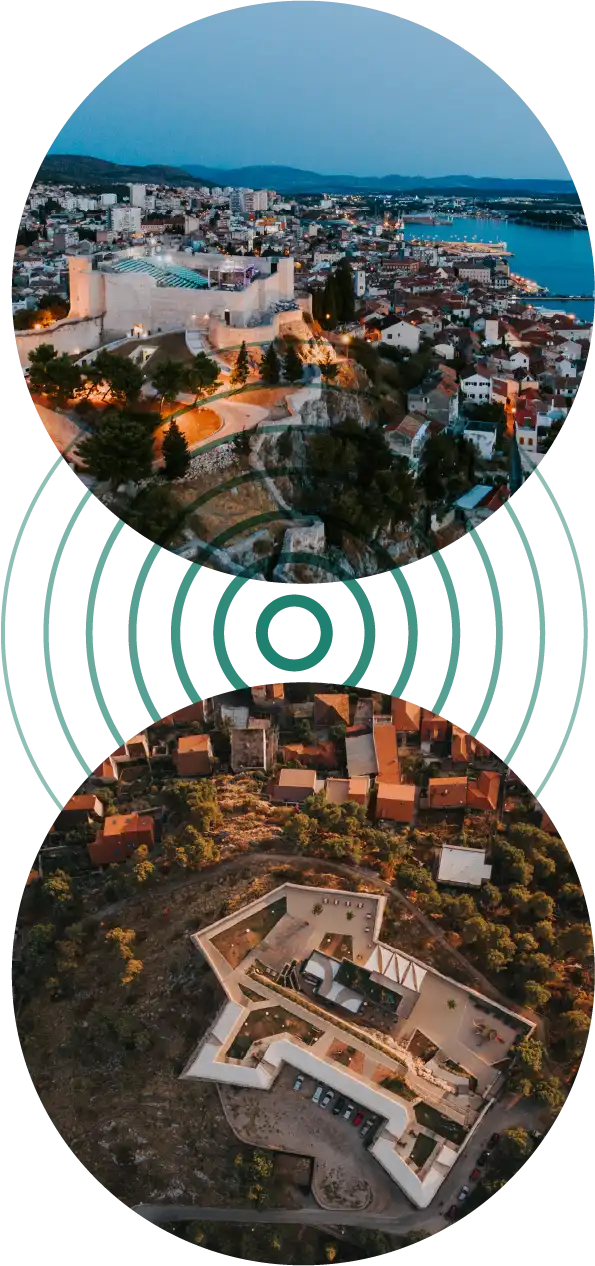
additional information
Open to all
The Conference welcomes presenters and non-presenters from all backgrounds. If you don’t have a proposal to submit and present, we welcome you to attend sessions, network, and learn. Registration opens on 16 July 2024.
Assessment of proposals
All proposals will be reviewed by at least two members of the Scientific Committee.
The assessment of proposals is based on the following criteria:
- Relevance to the Conference’s theme;
- Relevance to rural and non-urban areas;
- Innovative and sustainable examples of practices (for projects);
- Quality of approach, argumentation, and methodological and conceptual frameworks (for papers).
The acceptance of papers and projects will be subject to available presentation spaces.
Presentation guidelines
All verbal presentations of accepted papers and projects must be in English. Each presentation is timed at 10-15 minutes with additional time for questions and discussion. In the Proposal e-form, please indicate any audiovisual equipment you will need for your presentation.
Full paper publication opportunities
Important dates
| Deadline for submission of proposals | 15 July 2024 [new deadline] |
| Notification of proposal acceptance | By 16 July 2024 |
| Early bird registration period | |
| Regular registration period | 27 August – 5 September 2024 |
| Conference – live in Šibenik! | 25 – 27 September 2024 |
REgistration fees
| Students * | Other participants | |
| Early bird fees (16 July – 26 August) | 410 Euro / per person | 430 Euro / per person |
| Regular fees (27 August – 5 September) | 430 Euro / per person | 450 Euro / per person |
These fees cover the costs for participants at the conference, consisting of 1 welcome dinner, 3 lunches, and refreshment breaks during the event, conference materials (e.g., e-book of abstracts), and transfers for study visits.
* For student fees, documentation of these is required. When registering, please email scan of student card to in-situ-conference@ces.uc.pt.
Conference cancellation policy
If you should have to cancel your registration, notification in writing should be sent to in-situ-conference@ces.uc.pt. Please make sure you state the name of the conference in the subject line of your email.
- A refund of 75% of the full amount paid will be given for cancellations received until 26 August 2024.
- A refund of 40% of the full amount paid will be given for cancellations received between 27 August and 5 September 2024.
- No refund will be issued for cancellations received after 5 September 2024 nor failure to attend.
Additional notes about the registration form
- Why are we asking about gender?
As an Horizon Europe funded project, IN SITU integrates the gender dimension in a cross-cutting perspective throughout its activities.
The IN SITU project recognises gender as a key sociocultural and transversal matter. For research purposes within the project, five gender identities options are proposed to respondents: Cis Female, Cis Male, Transgender, Non-binary/ Genderqueer and Intersex. Additionally, it respects diverse identities by providing an “other gender” option and a privacy-focused “I do not wish to disclose” alternative. This framework is based on the literature stemming from the report Evaluations of Sexual Orientation and Gender Identity Survey Measures: What Have We Learned? of the Federal Interagency Working Group on Improving Measurement of Sexual Orientation and Gender Identity in Federal Surveys (pp. 53-57) and on the discussions developed during IN SITU Gender Committee meetings.
To know more about the gender dimension in the IN SITU project, please see here.
- IN SITU Data Protection Policy
The IN SITU project treats your data in compliance with the protection data standards set in the General Data Protection Regulation (GDPR).
The Conference registration form is managed by the IN SITU project Coordinator, the Centre for Social Studies of the University of Coimbra (CES). By registering, you agree to the processing of your data, according to the IN SITU Data Protection Policy. The data collected will be safely stored at CES during the development of the project and for at least 5 years after its completion. You have the right to exercise your data protection rights, such as the right to access, the right to rectification, the right to erasure, the right to restriction of processing, the right to data portability and the right to object to automatic processing in the terms established by the General Data Protection Regulation (GDPR).
If you have further queries regarding the nature of these rights or how to exercise them, you can contact the Data Protection Officer (DPO) of the institution that is collecting the data at epd@ces.uc.pt. You also have the right to lodge a complaint with the respective national authority and with the European Data Protection Supervisor.
More information about how we treat your data is available here.
TRAVEL AND ACCOMMODATIONS
Travelling to Šibenik
- Split Airport – 59 km from Šibenik
- Zadar Airport – 75 km from Šibenik
- Zagreb Airport – 351 km from Šibenik
Accommodation
There are several boutique hotels in Šibenik centre as well as hostels and private accommodation options. More affordable hotel capacities are available on the borderline of the town, well connected by public buses with the centre of the city.
Accommodation capacities can be found on:
Organising and
scientific committees
Organising
Committee
Dea Vidović, Kultura Nova Foundation, Croatia
Antonija Letinić, Kultura Nova Foundation, Croatia
Tamara Zamelli, Kultura Nova Foundation, Croatia
Marta Jalšovec, Kultura Nova Foundation, Croatia
Nancy Duxbury, Centre for Social Studies, University of Coimbra, Portugal
Paola Di Nunzio, Centre for Social Studies, University of Coimbra, Portugal
Ana Jaleco, Centre for Social Studies, University of Coimbra, Portugal
Sílvia Silva, Centre for Social Studies, University of Coimbra, Portugal
Inês Costa, Centre for Social Studies, University of Coimbra, Portugal
Scientific
Committee
members
Isabel Albergaria, University of the Azores, Portugal
Jon Aldazabal, Mondragon Innovation & Knowledge, Mondragon University, Spain
Nicola Cortinovis, Utrecht University, Netherlands
Nancy Duxbury, Centre for Social Studies, University of Coimbra, Portugal (co-chair)
Yana Dzharova-Karakoleva, National Academy of Theatre and Film Arts “Kr. Sarafov”, Bulgaria
Maryline Filippi, INRAE – Agroparistech, France
Martina Fraioli, European Network of Cultural Centres, Belgium
Bjarki Þór Grönfeldt Gunnarsson, Bifröst University, Iceland
Julius Heinicke, University of Hildesheim, Germany
Beate Kegler, University of Hildesheim, Germany
Ilona Kunda, Latvian Academy of Culture, Latvia
Pauliina Latvala-Harvilahti, University of Turku, Finland
Pilar Damião de Medeiros, University of the Azores, Portugal
Piotr Michalowski, European Network of Cultural Centres, Belgium
Oleksandra Nenko, University of Turku, Finland
Hugo Pinto, Centre for Social Studies, University of Coimbra; University of Algarve, Portugal
Bergsveinn Þórsson, Bifröst University, Iceland
Josune Prieto, Mondragon Innovation & Knowledge, Mondragon University, Spain
Mark Justin Rainey, University of Galway, Ireland
Maria Leonor Sampaio, University of the Azores, Portugal
Daniela Soares, University of the Azores, Portugal
Milene Tessarin, Utrecht University, Netherlands
Andrè Torre, INRAE – Agroparistech, France
Lidia Varbanova, National Academy of Theatre and Film Arts “Kr. Sarafov”, Bulgaria
Helena Walther, University of Hildesheim, Germany
Ieva Zemite, Latvian Academy of Culture, Latvia
Dea Vidović, Kultura Nova Foundation, Croatia (co-chair)
Contact
Any questions about proposal submissions and/or the conference should be e-mailed to in-situ-conference@ces.uc.pt.
